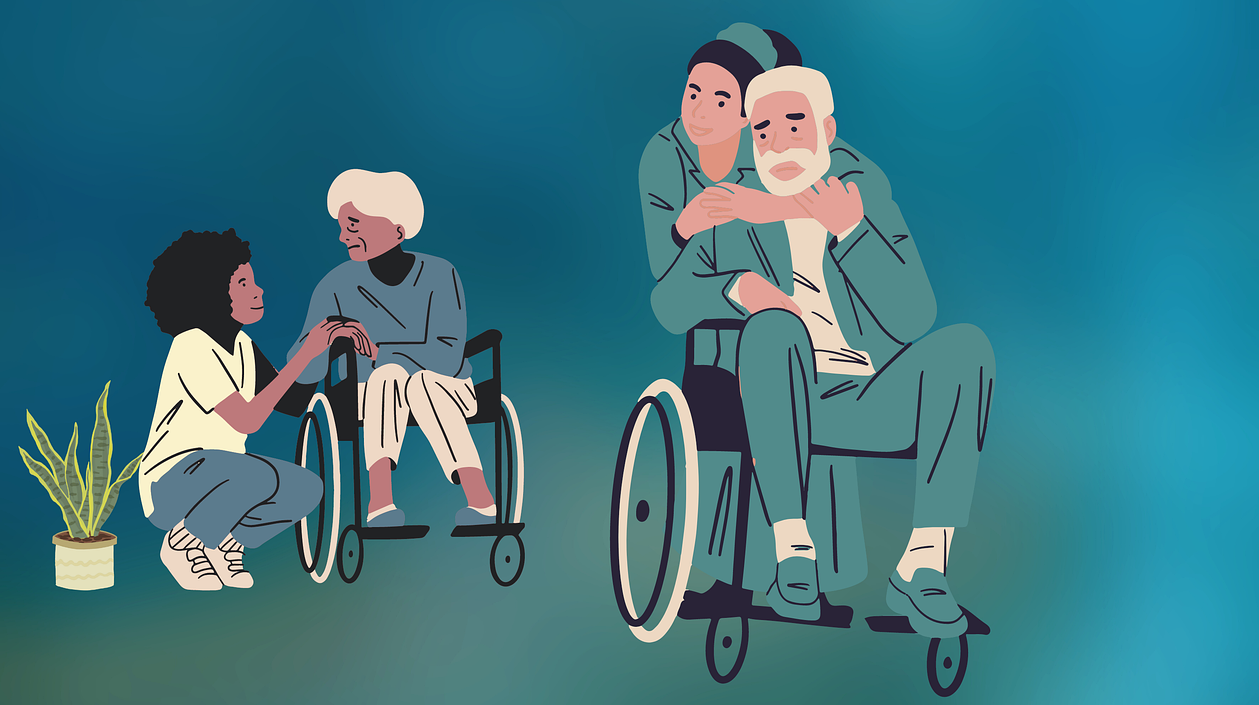Caregiver Relief and Respite
Respite refers to a temporary break from providing day-to-day care to an individual who needs assistance due to chronic or long-term illness, disability, or elderly age. Caregiver respite can help refresh and rejuvenate caregivers and provide them with a much-needed break.

Before we dive into this lesson, let's chat about how to pronounce "respite". It's one of those words that can be said differently depending on where you're from. Some folks may say "reh-spyt", I believe that is the British English version. While others opt for "ress-pit". That's the American English pronunciation. The correct pronunciation will depend on what side of the pond you are from.
Regardless of which way you say it, one thing is clear the meaning is the same and family caregivers all over the country need it.
For this lesson, I'll say "respite" since I'm from the good ol' USA. Now, I know I have caregivers tuning in from all over the world, so please forgive me if my pronunciation sounds a bit different from yours.
By the way, did you know that the word "respite" comes from the Latin word "respicere", which means, "to look back"? How cool is that? It gives caregivers a chance to take a step back and view their loved ones' situation from a new perspective. We all need a breather at some point in our lives, don't we? The definition in the Merriam Webster dictionary is a” short period of rest or relief from something difficult or unpleasant.” And family caregivers have one of thee most difficult jobs in the world.
Family Caregivers are the single largest pillar of the long term care industry

Caregiving plays a vital role in our country. One in 5 Americans is a caregiver. They provide over $600 billion dollars of unpaid care.
Respite refers to a temporary break from providing day-to-day care to an individual who needs assistance due to chronic or long-term illness, disability, or elderly age. Caregiver respite can help refresh and rejuvenate caregivers and provide them with a much-needed break. Even a temporary reprieve for simple things like taking a family member to the doctors, or the store, for example, can enhance your feelings of relief, allowing you to take a few moments to enjoy a cup of coffee or catch a much needed nap.
Caregivers offer support with social and health needs, including daily living tasks such as bathing, bill paying, shopping, and transportation. Caregiving also involves emotional support and assistance with managing chronic diseases or disabilities. These responsibilities can intensify, as the recipient's needs increase, adding stress to the caregiver's life.
Caregivers can be unpaid family members or friends, or they can be paid professionals. In the US, middle-aged and older adults are the single largest pillar of long term care system.
Over 60 million adult caregivers in the US provide assistance to loved ones over the age of 50, a role that can take a toll on their mental and physical well being. Unfortunately, there is no widely adopted system in the US to provide respite support for caregivers. Our government and even disease specific organizations promote cures for diseases, while overlooking a new condition, caregiver stress, burden and burnout.
The statistics for family caregivers are grim. 63% of family caregivers become seriously ill or die before the person they are caring for dies.
Caregiver Burnout is Real

Caregiver burnout is a real and serious issue that can lead to depression, chronic illnesses, impaired cognitive function, and a weakened immune system. Symptoms of burnout include social isolation, physical and emotional exhaustion, weight changes, depression or anxiety, and more.
One Client's Story about His Caregiving Journey
I want to share a story about Kip. Kip was a big, gregarious fellow. He was the middle child in the family and single and gay. He was a caregiver to his mom and dad. His two brothers felt that because he was single, Kip should be the one to provide care. Both brothers refused to offer support of any kind to Kip when he asked. Unfortunately, this is a common scenario for most caregivers.
Kip's dad had dementia and Kip promised he would his dad at home, until he passed. Kip also promised his dad, he would do the same for his mother. I met Kip a year after his father had passed. Kip mother was diagnosed with mild cognitive deficit disorder. She did not have dementia and was basically independent for most things. After the passing of her husband, she became very depressed and lacked interest in life.
Kip tired everything he could to make her feel better to no avail. Six months after her husband died, Kip mom had a massive stroke. She was not expected to live. Kip put her on hospice and waited for her to die. I'll never forget the conversation we had. Kip had called me to ask how to tell if a person is actively dying. I explained and Kip was disappointed that his mother was hanging on.
After all, Kip had been caring for his parents without a break for over 15 years. Kip told me he explained to his mother she could go home to be with his dad. Not to hang on for him. He told her he was so tired and just needed a rest. I encouraged Kip to have his mom placed in a nursing home for some respite care. He needed a break and it was apparent his mother was not going to be passing any time soon.
The Struggles of Caregiving

I know that must sound awful to hear that sentence- his mother was not going to be passing any time soon. I want you to know, there are so many caregivers that have a true sense of relief, after the death of their loved one. There are many family caregivers, just like Kip that feel guilt and shame because they try so hard to provide care and feel as if they are a failure if they ask for help or need a break. Sadly, Kip put his mom in a nursing home on hospice so he could go into the hospital for some cardiac testing. Kip never made it out of the hospital. He had a massive heart attack and died during his procedure.
I share this story, because Kip did delay his own health care to provide care. This is one of many stories I have about my selfless caregivers that succumbed to caregiver stress and burden. Caregiver burnout out leads to a condition called compassion fatigue.
What is Compassion Fatigue?
Have you ever heard of compassion fatigue? It's when you feel emotionally and physically drained, zapping your ability to empathize or care about the feeling of others. Some describe it as the negative cost of caring. It's also known as secondary traumatic stress. It is the result of not getting any type of respite.
Why Respite Care is Necessary

To prevent caregiver burnout, relief or respite is crucial, allowing caregivers to focus on their own emotional and physical health and maintain a healthy balance between caregiving and other aspects of life. This is an overwhelming task for most to accomplish. A temporary delay in self-care may have negative health consequences.
I like to use the analogy of the flight attendants presentation, before take off. They always instruct the passengers, if you have a child or other family member traveling with you, please put your oxygen mask on first. Then, when you are safe and breathing in air, place the mask on those around you. So many of my caregivers, forget that, and put the oxygen mask on their family member first. In other words, caregivers give of themselves; ignore their own health and well being, to provide care for another. Many lose their health, or even their life doing so. That is why I am so adamant about supporting the family caregiver and getting respite from the daily stress and strain, and challenges they face.
Affordable Respite Care is almost Non Existent
To add to this lack of resources, and lack of formal respite care programs, we have a direct care worker shortage. Globally, we have more seniors than youth. As the baby boomers turn 80 yrs. old in 2030 and the youngest of the boomers retiring in 2025, we need to address the situation by looking at caregiving as a societal issue and take steps to make important changes in how approach caregiving.
We at Caregiver Relief are starting a grassroots effort to help make those changes. We have a cure for caregiver stress and burnout. And it starts with you.
The Team Approach to Care

Let me explain. Caregiver relief is encouraging taking a TEAM approach to family caregiving. This approach will allow for optimal emotional, social, and practical support throughout the caregiver journey. This includes the caregiver, family members, and individual team members who are committed to overcoming any challenge that may arise along your caregiving journey.
It's crucial to prioritize caregiver relief or respite care to maintain your mental and physical health. In fact, studies show that 20% of family caregivers suffer from depression, which is twice the general population's rate. Long-term caregiver stress and burnout can lead to serious health problems like weakened immune systems, cognitive impairment, and an increased risk of chronic diseases such as heart disease, cancer, and diabetes. The effects of caregiver stress can be felt as long as 6 years after your caregiving journey ends.
Practice Self Care

That is why is it important to take care of you and prioritize relief and respite to avoid these risks and maintain emotional and physical stability. Don't take your own emotional and physical well being for granted. Ongoing brief respite care periods can give you brief reprieve from the stress and allow you to focus on your own health and well-being.
We want to show you how to take advantage of respite opportunities, even temporary respite so you can reduce social isolation, regain focus and energy, pursue interests outside of caregiving, and maintain emotional and physical health. Remember, there will be life after caregiving. All relationships are like a garden. Like a garden, you need to nurture and spend time with others, or your relationships will wither and die.
National Crisis
We are facing a national crisis. A growing senior population is outpacing the number of direct care workers available to provide the necessary services. Not to mention, family caregivers are overstressed and lack the needed support. There is no “winning” aspect of the situation. Not yet anyway.
Presently the needs of the family caregiver go unnoticed, unappreciated and unacknowledged. They are the largest invisible home health provider group in the USA. Right now each family caregiver has to carve out their own path. That is why we have developed a team approach to care.
Caregiver Relief has provided an online platform to help the family caregiver in multiple ways. Our online platform provides you a centralized place to manage your family members care with the entire care team. This will include family, friends, neighbors and even your health care professionals.
Reasons to Create a Care Team Partner Group

Discover the top two reasons why a support team is crucial when caring for a loved one who is ill or living with dementia. First, your family member will require an advocate who can provide support when they are struggling or feeling unwell. Without someone to advocate on their behalf, they may not receive the care they require. Secondly, caregiving often falls solely on one person, which is too much for anyone to handle alone. A strong care team can provide the support you need to share the responsibilities and avoid caregiver burnout.
If you're hesitant about asking for help, you're not alone. There are many things to consider, such as your family member's wishes and your own desire for control. However, facing caregiver stress alone can be dangerous for your health and well-being. On top of that, caregivers often leave their jobs to care for a loved one, which can lead to financial strain.
Building a support team is essential for a balanced life and can be done with friends, co-workers, and church members if you don't have a large family. It's about finding people who are reliable and willing to share in the responsibilities, no matter how small.
By creating an army of advocates, you'll have the support you need to navigate this challenging journey. So take the first step and identify those who can help, even if they don't live nearby. Remember, caregiver stress kills, so don't go it alone.
Benefits of a Care Team Partner Group
Caregiving can be overwhelming for one person, which is why having a team is crucial. Many family caregivers do not realize that the average caregiving journey is 6 to 8 years. Many journeys may last as long s 20 years Statistics show that caregiving is a challenging and often thankless job. Caregiver Relief has a system that can help support your health and well-being, as caregiver stress can be fatal.
We understand that asking for help is not always easy. From managing expectations to relinquishing control, there are many things to consider. But we urge you to change your mindset and remember that caregiving is not a journey you should embark on alone; your life and your loved one's life depend on it.
Family caregivers often find themselves leaving their jobs and facing negative financial impacts. The caregiving journey can last up to 20 years, which has a detrimental effect on both caregivers and employers.
That's why a support team is essential. Even if you don't have a large family or siblings, you can always build a team from friends, coworkers, and church members. The key is to have a team that can share responsibilities, providing balance to your life. Whether it's minor tasks or extensive caregiving duties, every little bit helps. Every task you delegate gives you a brief respite to focus on other tasks.
Building a Team of Advocates
Think of this as developing a team of advocates; they will support you and your loved one through this journey. So, take the first step and identify who can help. Don't be afraid to reach out to reliable friends, community members, or church members. Remember, creating an army of advocates is the key to success.
Ways to get Respite
As a caregiver, taking breaks is important for your own well-being and that of your loved one. Here are some ways to relieve the burden and ensure you both get the care you need.
Hire Outside Help
Consider hiring hourly, to provide temporary care for a short period, to help to give you time to run errands, meet friends or indulge in an enjoyable activity. If the financial cost is a concern, talk about how you might pay for and schedule caregivers with your loved ones. Creating a team of family. friends and even volunteers will give you respite, and it will not cost you anything. Use our online platform to make that request without feeling anxious or imposing on others times. People often want to help; they do not know what you need. You need a rest, a temporary respite from the day-to-day responsibilities of caregiving. You deserve it.
Ask for Help

Don't hesitate to ask other family members to pitch in. Even small tasks like shopping or taking care of the lawn can make a big difference. If you use caregiver reliefs online care management platform, you can communicate your needs as well as organize schedules with our online calendar. Asking for help is not always in a family caregivers vocabulary. I can give you so many examples of caregivers that need support, and they delay asking for it, in hopes someone will offer.
Advocate for Yourself
Advocate for yourself by taking responsibility for your health care. Commit to eating right, making changes to your diet and activity, can improve your mood and give you confidence. Get out in nature every day- even for a short period of time. Don't put off medical appointments. Even a short delay in addressing your health can make a difference. Remember, without you it all falls apart. Make yourself and your health a priority.
Starting early to strategize ways to take breaks. This helps you and your loved ones adjust to the idea of using other caregivers, and may help you avoid quitting your job.
The Caregiving Role is the most guilt-producing role you will ever take on
Accept that feeling guilty is a normal part of taking a break and seek support from trusted friends, family members, or a therapist. The caregiver role is the single more guilt-producing role you will ever take on. Guilt is a negative and useless emotion that negates all the good you do.
Let Go of Control

As a caregiver, it's natural to feel like you're the only one who can care for your loved one. However, it's important to remember that letting others take control occasionally can provide much-needed respite relief. Although others may not do things the same way you do, trust that they will take good care of your loved one.
Create a plan and schedule time for yourself and stick to it. Even if it's just small breaks like a morning walk or socializing with friends. Putting these breaks on your calendar helps ensure you follow through with them.
Learn to Set Limits and Boundaries
If you're a caregiver, you need to learn to set limits with your loved ones to avoid burnout. Learn to Say "no". It's not uncommon for loved ones to make constant demands of your time, leaving you feeling overwhelmed and drained. Prioritizing requests and learning to recognize which ones are urgent can help you create emotional space and avoid burnout. Remember, taking care of you is just as important as taking care of others.
Don't be afraid to set boundaries that allow you to focus on your health and wellbeing. If you have a hard time with setting limits and boundaries, check out our eldercare communication course. We have several lessons on these topics and more. Check out Caregiver Relief’s Elder Care Communication Course.
You might also like this article:











